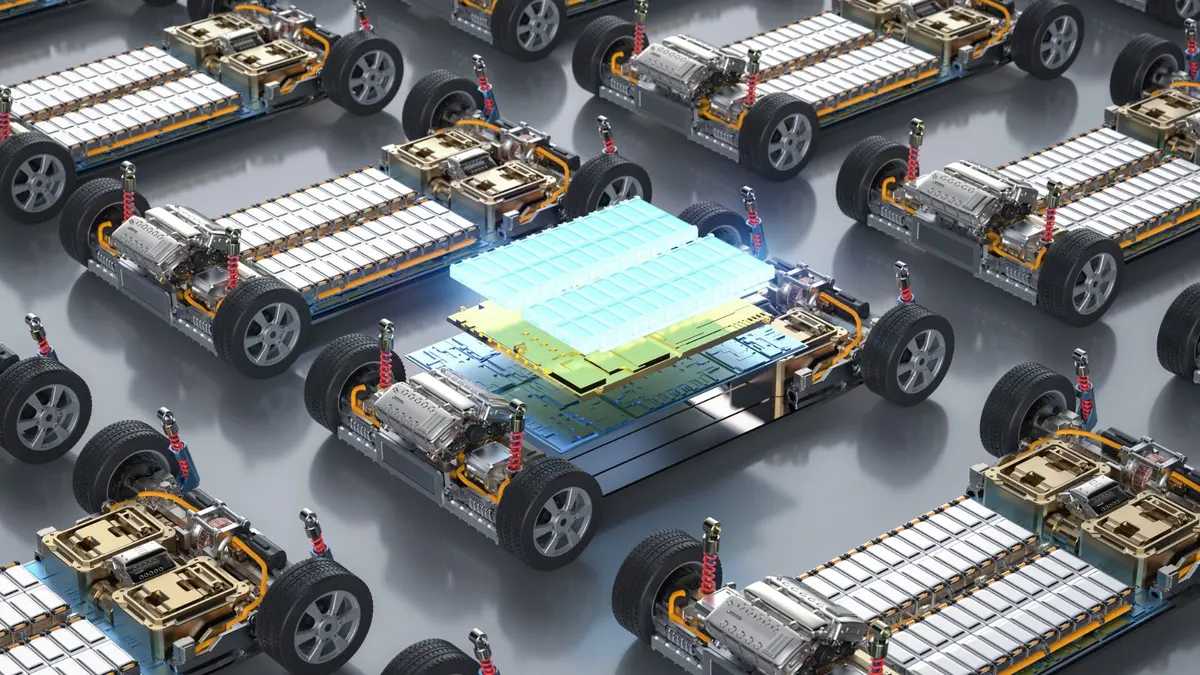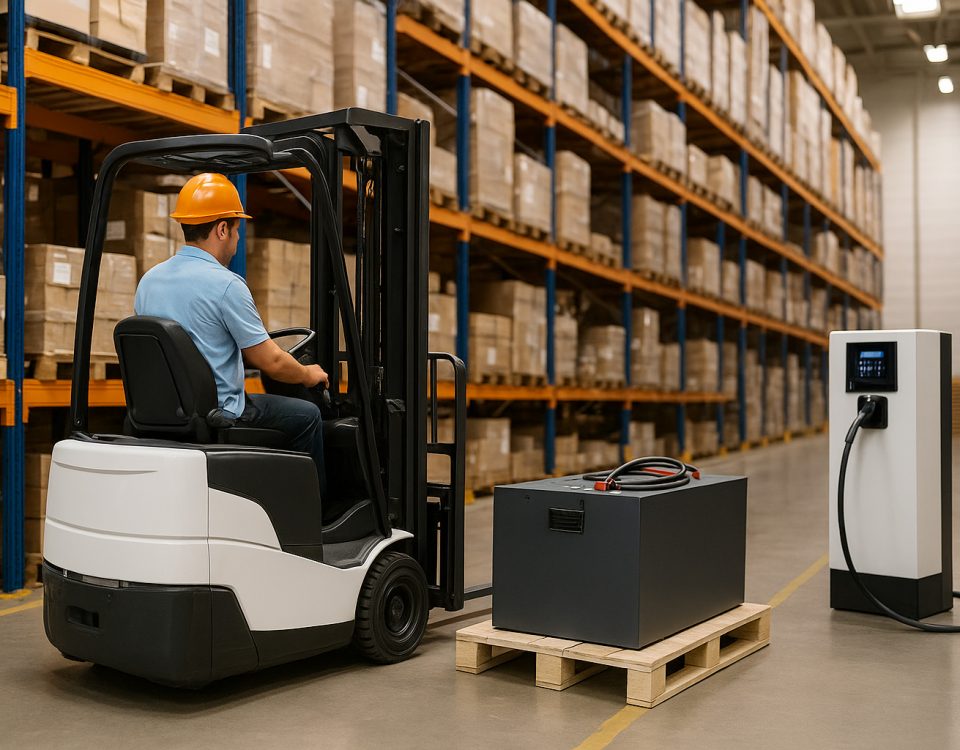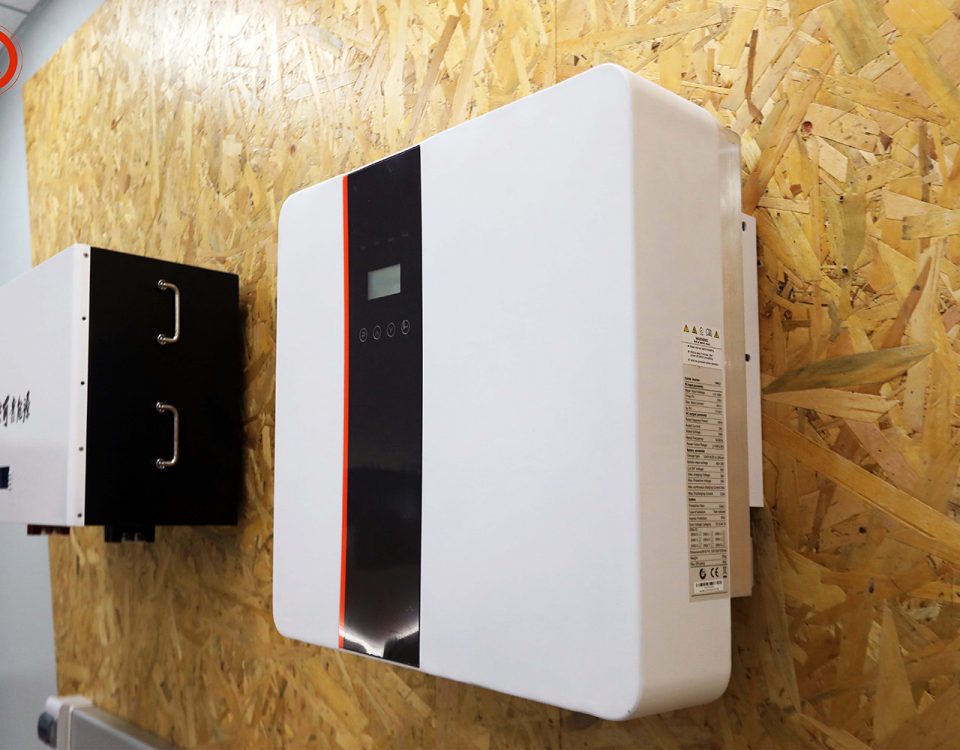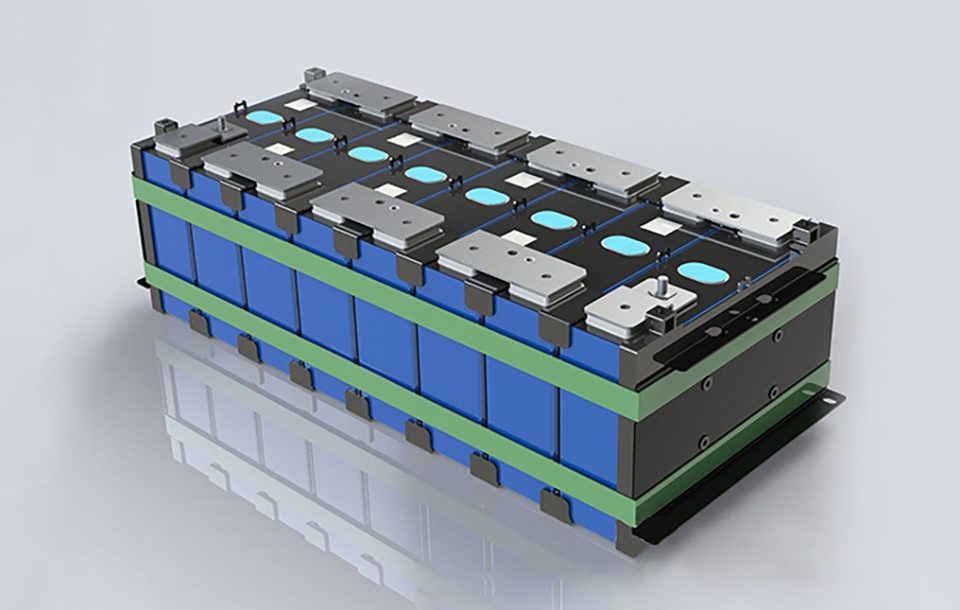อุตสาหกรรมยานยนต์กำลังเผชิญกับการเปลี่ยนแปลงครั้งใหญ่ โดยมีรถยนต์ไฟฟ้า (EVs) เป็นผู้นำในการขับเคลื่อนสู่อนาคตที่ยั่งยืนมากขึ้น หัวใจสำคัญของการเปลี่ยนแปลงนี้คือแบตเตอรี่ ซึ่งมีบทบาทสำคัญในการกำหนดประสิทธิภาพ ความปลอดภัย และความคุ้มค่าของรถยนต์ไฟฟ้า ในบรรดาเทคโนโลยีแบตเตอรี่ที่มีอยู่มากมาย แบตเตอรี่ LiFePO4 ได้กลายเป็นทางเลือกที่มีศักยภาพสำหรับรถยนต์ไฟฟ้า บทความนี้จะสำรวจเหตุผลที่แบตเตอรี่ LiFePO4 กำลังจะกลายเป็นแรงขับเคลื่อนหลักของอนาคตยานยนต์ไฟฟ้า โดยเจาะลึกถึงข้อดี ความท้าทาย และนวัตกรรมทางเทคโนโลยีที่สำคัญ
ความต้องการของรถยนต์ไฟฟ้าต่อเทคโนโลยีแบตเตอรี่
ยานยนต์ไฟฟ้าต้องการเทคโนโลยีแบตเตอรี่ที่มีข้อกำหนดเฉพาะเพื่อให้มั่นใจถึงประสิทธิภาพการทำงานที่ดีที่สุด ซึ่งรวมถึงความหนาแน่นของพลังงาน ความปลอดภัย ต้นทุน และอายุการใช้งานของแบตเตอรี่—ปัจจัยสำคัญสี่ประการที่มีผลกระทบโดยตรงต่อความเป็นไปได้และการยอมรับของผู้บริโภคในยานยนต์ไฟฟ้า
-
ความหนาแน่นของพลังงาน: ความหนาแน่นของพลังงานเป็นตัวกำหนดปริมาณพลังงานที่แบตเตอรี่สามารถเก็บไว้ได้ ซึ่งส่งผลโดยตรงต่อระยะทางในการขับขี่ของรถยนต์ไฟฟ้า ระยะทางที่ไกลขึ้นทำให้รถยนต์มีความน่าสนใจมากขึ้นสำหรับผู้ซื้อที่มีศักยภาพ ทำให้ความหนาแน่นของพลังงานสูงกลายเป็นคุณสมบัติที่สำคัญอย่างยิ่งสำหรับแบตเตอรี่รถยนต์ไฟฟ้า
-
ความปลอดภัย: ความปลอดภัยเป็นสิ่งสำคัญสูงสุดเมื่อพูดถึงแบตเตอรี่รถยนต์ไฟฟ้า (EV) ความล้มเหลวเช่นการเกิดความร้อนสูงเกินไปหรือการเกิดภาวะความร้อนเกินควบคุม (thermal runaway) อาจก่อให้เกิดความเสี่ยงอย่างร้ายแรงได้ ผู้บริโภคกำลังมองหาแบตเตอรี่ที่มีระดับความปลอดภัยสูง ซึ่งช่วยให้รถยนต์ของพวกเขามีเสถียรภาพแม้ในสภาพการใช้งานที่รุนแรงที่สุด
-
ค่าใช้จ่าย: ค่าใช้จ่ายของแบตเตอรีเป็นหนึ่งในปัจจัยหลักที่มีส่วนทำให้ราคาของรถยนต์ไฟฟ้าสูงขึ้น. ด้วยการลดค่าใช้จ่ายของแบตเตอรี ผู้ผลิตสามารถลดราคาของรถยนต์ไฟฟ้าโดยรวมได้ ทำให้รถยนต์ไฟฟ้าสามารถเป็นเจ้าของได้มากขึ้นสำหรับผู้คนหลากหลายกลุ่ม.
-
อายุการใช้งาน: อายุการใช้งานของแบตเตอรี่เป็นอีกหนึ่งปัจจัยสำคัญ แบตเตอรี่ที่เสื่อมสภาพอย่างรวดเร็วจำเป็นต้องเปลี่ยนใหม่ซึ่งมีค่าใช้จ่ายสูง อาจทำให้ผู้ซื้อลังเลใจได้ แบตเตอรี่ที่มีอายุการใช้งานยาวนานช่วยให้ผู้บริโภคได้รับความคุ้มค่าจากการลงทุนมากยิ่งขึ้น
แบตเตอรี่ LiFePO4 มีความสมดุลของปัจจัยเหล่านี้ ทำให้เป็นตัวเลือกที่น่าสนใจสำหรับผู้ผลิตและผู้บริโภคเช่นกัน
ข้อดีของแบตเตอรี่ LiFePO4 เมื่อเทียบกับประเภทอื่น
แบตเตอรี่ LiFePO4 มีข้อได้เปรียบหลายประการเมื่อเทียบกับแบตเตอรี่ลิเธียมไอออนชนิดอื่น เช่น แบตเตอรี่ NCM (นิกเกิล โคบอลต์ แมงกานีส) หรือ NCA (นิกเกิล โคบอลต์ อะลูมิเนียม) ต่อไปนี้คือข้อดีหลัก:
-
ความปลอดภัย: หนึ่งในข้อได้เปรียบที่สำคัญที่สุดของแบตเตอรี่ LiFePO4 คือโปรไฟล์ความปลอดภัยที่เหนือกว่า เมื่อเทียบกับแบตเตอรี่ลิเธียมไอออนชนิดอื่น ๆ แบตเตอรี่ LiFePO4 มีความทนทานต่อความร้อนสูงและการเกิดไฟไหม้จากการควบคุมอุณหภูมิไม่ได้ โครงสร้างทางเคมีที่เสถียรทำให้มีความเสี่ยงในการเกิดไฟไหม้ต่ำ จึงเป็นตัวเลือกที่ปลอดภัยกว่าสำหรับผู้ผลิตยานยนต์ไฟฟ้าและผู้ขับขี่
-
ความคุ้มค่า: แบตเตอรี่ LiFePO4 มักมีต้นทุนการผลิตต่ำกว่าแบตเตอรี่ประเภท NCM หรือ NCA วัสดุที่ใช้ใน LiFePO4 ได้แก่ เหล็กและฟอสเฟต ซึ่งมีปริมาณมากและมีราคาถูกกว่าโคบอลต์และนิกเกิลที่จำเป็นสำหรับแบตเตอรี่ประเภทอื่น ๆ ส่งผลให้ผู้ผลิตมีต้นทุนต่ำลง ซึ่งสามารถช่วยให้รถยนต์ไฟฟ้าเข้าถึงผู้บริโภคได้ในราคาที่จับต้องได้มากขึ้น
-
อายุยืนยาว: แบตเตอรี่ LiFePO4 มีอายุการใช้งานที่ยาวนานกว่าเมื่อเทียบกับแบตเตอรี่ลิเธียมไอออนชนิดอื่น ๆ นั่นหมายความว่าสามารถรองรับการชาร์จและการคายประจุได้มากกว่าหลายรอบก่อนที่จะสูญเสียความจุอย่างมีนัยสำคัญ ส่งผลให้รถยนต์ไฟฟ้าใช้งานได้นานขึ้น สำหรับผู้บริโภคแล้ว หมายถึงการเปลี่ยนแบตเตอรี่น้อยลงและค่าใช้จ่ายในการบำรุงรักษาโดยรวมที่ต่ำลง
-
ผลกระทบต่อสิ่งแวดล้อม: วัตถุดิบที่ใช้ในแบตเตอรี่ LiFePO4 เป็นมิตรต่อสิ่งแวดล้อมมากกว่าวัตถุดิบที่ใช้ในแบตเตอรี่ลิเธียมไอออนชนิดอื่น ๆ เหล็กและฟอสเฟตมีอยู่มากและก่อให้เกิดอันตรายต่อสิ่งแวดล้อมน้อยกว่าโคบอลต์และนิกเกิล ทำให้แบตเตอรี่ LiFePO4 เป็นทางเลือกที่ยั่งยืนกว่าสำหรับอุตสาหกรรมยานยนต์
-
ความเสถียรทางความร้อน: แบตเตอรี่ LiFePO4 ให้ประสิทธิภาพที่ดีกว่าในช่วงอุณหภูมิที่กว้างขึ้น ทำให้เหมาะสำหรับสภาพอากาศที่หลากหลาย ไม่ว่าจะเป็นฤดูร้อนที่ร้อนหรือฤดูหนาวที่หนาวเย็น แบตเตอรี่ LiFePO4 ให้ประสิทธิภาพที่เชื่อถือได้ ซึ่งเป็นสิ่งสำคัญสำหรับยานพาหนะไฟฟ้าที่ต้องใช้งานในภูมิภาคต่างๆ
ความท้าทายในสภาพอากาศหนาวสำหรับแบตเตอรี่ LiFePO4
แม้จะมีข้อดีมากมาย แบตเตอรี่ LiFePO4 เผชิญกับความท้าทายเมื่อใช้ในสภาพอากาศหนาวเย็น อุณหภูมิต่ำสามารถส่งผลกระทบต่อประสิทธิภาพของแบตเตอรี่ได้อย่างมาก ทำให้พลังงานที่จ่ายออก ความเร็วในการชาร์จ และระยะทางที่วิ่งได้ลดลง สิ่งนี้เป็นปัญหาโดยเฉพาะอย่างยิ่งในภูมิภาคที่มีฤดูหนาวรุนแรง เนื่องจากผู้ขับขี่คาดหวังให้รถยนต์ไฟฟ้าของตนทำงานได้อย่างน่าเชื่อถือตลอดทั้งปี
ในสภาพอากาศหนาวเย็น ปฏิกิริยาเคมีภายในแบตเตอรี่จะช้าลง ทำให้แบตเตอรี่จ่ายพลังงานได้ยากขึ้น สารละลายอิเล็กโทรไลต์ภายในแบตเตอรี่จะมีความหนืดมากขึ้น และแรงต้านทานภายในจะเพิ่มขึ้น ส่งผลให้ประสิทธิภาพลดลง
อย่างไรก็ตาม ความก้าวหน้าทางเทคโนโลยีกำลังแก้ไขปัญหาประสิทธิภาพในสภาพอากาศหนาวเย็นเหล่านี้ ระบบจัดการความร้อนใหม่กำลังถูกพัฒนาเพื่อรักษาอุณหภูมิของแบตเตอรี่ให้อยู่ในระดับที่เหมาะสม แม้ในสภาพอากาศหนาวจัด ระบบจัดการแบตเตอรี่ (BMS) ก็ได้รับการปรับปรุงเพื่อตรวจสอบและควบคุมอุณหภูมิของแบตเตอรี่ เพื่อให้มั่นใจถึงประสิทธิภาพที่สม่ำเสมอในสภาพแวดล้อมที่หลากหลาย
นวัตกรรมทางเทคโนโลยีเหล่านี้จะช่วยให้แบตเตอรี่ LiFePO4 มีความเหมาะสมมากยิ่งขึ้นสำหรับการใช้งานในภูมิภาคที่มีอากาศหนาวเย็น เพิ่มความน่าสนใจให้กับผู้บริโภคในหลากหลายสภาพภูมิอากาศ
การก้าวหน้าทางเทคโนโลยีที่สำคัญเพื่อปรับปรุงประสิทธิภาพของแบตเตอรี่ LiFePO4 ในรถยนต์ไฟฟ้า
มีการพัฒนาเทคโนโลยีหลายประการที่กำลังดำเนินการเพื่อปรับปรุงประสิทธิภาพของแบตเตอรี่ LiFePO4 ในรถยนต์ไฟฟ้า ความก้าวหน้าเหล่านี้มีเป้าหมายเพื่อแก้ไขปัญหาที่พบในปัจจุบันและปลดล็อกศักยภาพเพิ่มเติมสำหรับเทคโนโลยีที่มีแนวโน้มนี้
-
อิเล็กโทรไลต์ที่เสริมประสิทธิภาพ: นักวิจัยกำลังศึกษาสูตรอิเล็กโทรไลต์ใหม่ ๆ ที่ช่วยเพิ่มประสิทธิภาพและความเสถียรทางความร้อนของแบตเตอรีลิเธียม-ไอออนฟอสเฟต (LiFePO4) อิเล็กโทรไลต์ที่ได้รับการปรับปรุงเหล่านี้อาจช่วยลดปัญหาประสิทธิภาพที่เกิดจากอุณหภูมิต่ำ และขยายช่วงการใช้งานของแบตเตอรีได้
-
ระบบจัดการแบตเตอรี่ขั้นสูง (BMS): ระบบการจัดการแบตเตอรีมีบทบาทสำคัญอย่างยิ่งในการเพิ่มประสิทธิภาพของแบตเตอรีลิเธียมฟอสเฟต (LiFePO4) ด้วยการพัฒนาเทคโนโลยีระบบการจัดการแบตเตอรี (BMS) ที่ซับซ้อนมากขึ้น จะสามารถจัดการอุณหภูมิของแบตเตอรี วงจรการชาร์จ และการไหลของพลังงานได้ดีขึ้น ซึ่งช่วยให้แบตเตอรีทำงานได้อย่างเต็มประสิทธิภาพในสภาพแวดล้อมต่าง ๆ
-
ความหนาแน่นของพลังงานเพิ่มขึ้น: หนึ่งในข้อจำกัดปัจจุบันของแบตเตอรี่ LiFePO4 คือความหนาแน่นของพลังงานที่ค่อนข้างต่ำกว่าเมื่อเทียบกับเคมีแบตเตอรี่อื่น ๆ เช่น NCM หรือ NCA อย่างไรก็ตาม การวิจัยเพื่อเพิ่มความหนาแน่นของพลังงานในแบตเตอรี่ LiFePO4 กำลังดำเนินอยู่ เมื่อความหนาแน่นของพลังงานดีขึ้น รถยนต์ไฟฟ้าจะสามารถเดินทางได้ไกลขึ้นต่อการชาร์จหนึ่งครั้งโดยไม่ต้องเพิ่มขนาดของชุดแบตเตอรี่
-
เทคโนโลยีแบตเตอรี่แบบโซลิดสเตต: แบตเตอรี่แบบโซลิดสเตตเป็นอีกหนึ่งด้านที่ได้รับความสนใจในวงการวิจัยแบตเตอรี่ แบตเตอรี่ประเภทนี้สัญญาว่าจะให้ความหนาแน่นของพลังงานที่สูงขึ้น ความปลอดภัยที่ดีกว่า และประสิทธิภาพที่ดีขึ้นในอุณหภูมิต่ำ หากประสบความสำเร็จ แบตเตอรี่ลิเธียมเหล็กฟอสเฟตแบบโซลิดสเตต (LiFePO4) อาจช่วยปรับปรุงประสิทธิภาพโดยรวมและความสามารถในการแข่งขันของรถยนต์ไฟฟ้า (EV) ในตลาดได้อย่างมาก
ตัวอย่างตลาด: รถยนต์ไฟฟ้าที่ใช้แบตเตอรี่ LiFePO4
ผู้ผลิตรถยนต์ไฟฟ้าชั้นนำหลายรายได้นำเทคโนโลยีแบตเตอรี่ LiFePO4 มาใช้แล้ว โดยได้ติดตั้งในรุ่นต่างๆ เพื่อมอบทางเลือกที่เชื่อถือได้และคุ้มค่าให้กับผู้บริโภค แทนการใช้เคมีแบตเตอรี่ประเภทอื่นๆ
-
เทสลา: เทสลา ผู้บุกเบิกในอุตสาหกรรมรถยนต์ไฟฟ้า ได้เลือกใช้แบตเตอรี่ LiFePO4 สำหรับบางรุ่น โดยเฉพาะรุ่น Standard Range ของ Model 3 และ Model Y รถยนต์เหล่านี้ได้รับประโยชน์จากประสิทธิภาพด้านต้นทุนและความทนทานของแบตเตอรี่ LiFePO4 พร้อมมอบประสบการณ์การขับขี่ที่ปลอดภัยและมีประสิทธิภาพ
-
บีวายดี: BYD ผู้ผลิตรถยนต์ไฟฟ้าชั้นนำจากประเทศจีน ใช้แบตเตอรี่ LiFePO4 ในหลายรุ่นของรถยนต์ รวมถึง BYD Tang และ BYD Qin การใช้เทคโนโลยีนี้ของพวกเขาเน้นให้เห็นถึงแนวโน้มที่เพิ่มขึ้นของการใช้ LiFePO4 ในตลาดรถยนต์ไฟฟ้าทั่วโลก
-
ฟอร์ด: ฟอร์ดได้ประกาศแผนการที่จะนำแบตเตอรี่ LiFePO4 มาใช้ในรถยนต์ไฟฟ้าที่มีราคาประหยัดในอนาคต การเคลื่อนไหวนี้เน้นย้ำถึงการยอมรับที่เพิ่มขึ้นของ LiFePO4 ในฐานะโซลูชันที่ใช้งานได้จริงสำหรับรถยนต์ไฟฟ้าในตลาดมวลชน
-
NIO: ผู้ผลิตรถยนต์ไฟฟ้าจากจีน NIO ได้ผสานแบตเตอรี่ LiFePO4 เข้ากับรถยนต์หลายรุ่นของตนแล้ว นี่แสดงให้เห็นถึงความหลากหลายและความสามารถในการปรับขนาดของแบตเตอรี่ LiFePO4 ในการตอบสนองความต้องการของรถยนต์ไฟฟ้าหลากหลายประเภท
บทสรุป: อนาคตของแบตเตอรี่ LiFePO4 ในยานยนต์ไฟฟ้า
ในขณะที่อุตสาหกรรมยานยนต์ทั่วโลกกำลังเปลี่ยนไปสู่ยานยนต์ไฟฟ้า แบตเตอรี่ LiFePO4 กำลังกลายเป็นส่วนสำคัญมากขึ้นในสมการนี้ ความปลอดภัยที่เหนือกว่า ความคุ้มค่า อายุการใช้งานที่ยาวนาน และความเสถียรทางความร้อน ทำให้แบตเตอรี่ LiFePO4 เป็นตัวเลือกที่เหมาะสมสำหรับผู้ผลิตและผู้บริโภคยานยนต์ไฟฟ้า ด้วยนวัตกรรมทางเทคโนโลยีที่ต่อเนื่อง รวมถึงการปรับปรุงประสิทธิภาพในสภาพอากาศหนาวเย็นและความหนาแน่นของพลังงานที่เพิ่มขึ้น แบตเตอรี่ LiFePO4 มีแนวโน้มที่จะมีบทบาทสำคัญในการกำหนดอนาคตของยานยนต์ไฟฟ้า
สำหรับผู้ผลิตที่กำลังมองหาโซลูชันแบตเตอรี่ที่เชื่อถือได้และมีประสิทธิภาพสูง ริชชี่, ผู้ผลิตแบตเตอรี่ลิเธียมมืออาชีพ, นำเสนอแบตเตอรี่ LiFePO4 ที่ปรับแต่งตามความต้องการ ซึ่งตอบสนองความต้องการที่เข้มงวดของอุตสาหกรรมยานยนต์ไฟฟ้า. เป็นที่รู้จักในด้านคุณภาพที่ยอดเยี่ยม, ประสิทธิภาพ, ความปลอดภัย, และราคาที่แข่งขันได้, แบตเตอรี่ของ RICHYE มอบเทคโนโลยีล้ำสมัยให้กับผู้ผลิตเพื่อให้สามารถแข่งขันในตลาดยานยนต์ไฟฟ้าที่เปลี่ยนแปลงอย่างรวดเร็ว.
เนื่องจากความต้องการรถยนต์ไฟฟ้าเพิ่มขึ้นอย่างต่อเนื่อง แบตเตอรี่ LiFePO4 จะกลายเป็นผู้เล่นสำคัญอย่างไม่ต้องสงสัยในการขับเคลื่อนอนาคตของการขนส่งที่ยั่งยืน




